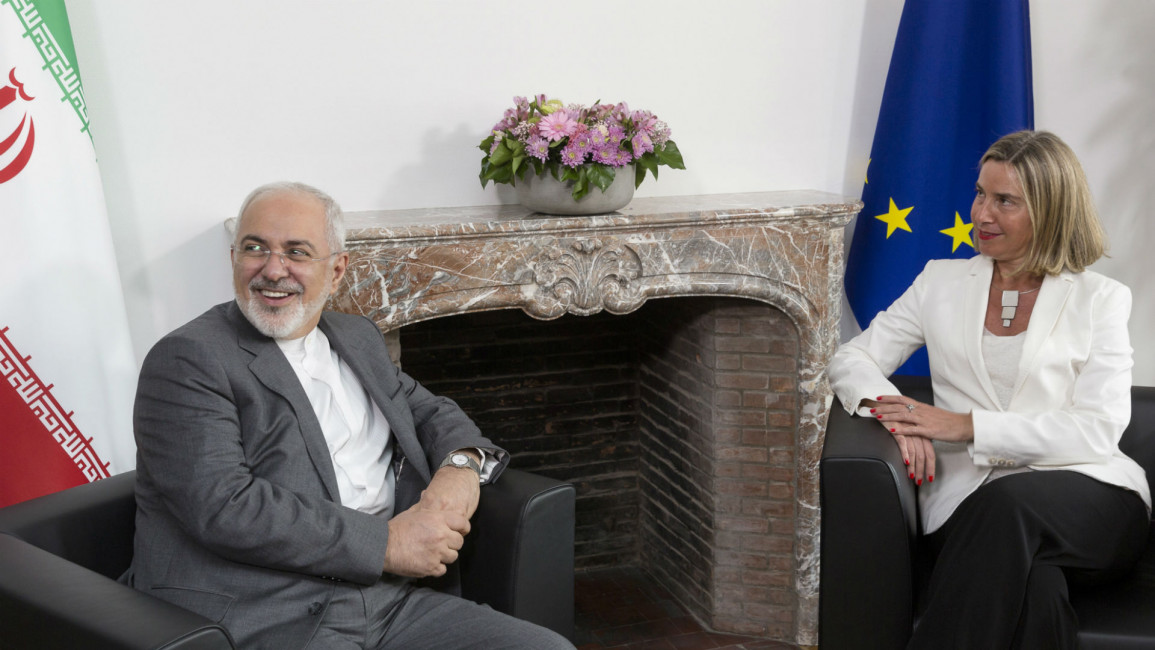Iran and EU diplomats meet in last-minute effort to save nuclear deal
Iran's foreign minister Mohammad Javad Zarif began talks in Brussels on Tuesday on the final leg of a global tour rallying diplomatic support for the country's nuclear deal after the abrupt withdrawal by the US.
Zarif met the EU's foreign policy chief Federica Mogherini ahead of talks with counterparts from the UK, France and Germany - the three European signatories to the landmark deal who are scrambling to preserve it.
Tehran has warned it is preparing to resume "industrial-scale" uranium enrichment "without any restrictions" unless Europe can provide solid guarantees that it can maintain the economic benefits it gained from the nuclear agreement, despite the US re-imposing sanctions on Iran.
The EU insists the deal is working, pointing to repeated UN inspections verifying Iran's compliance with its side of the bargain, and Mogherini's spokeswoman Maja Kocijancic told AFP ahead of Zarif's arrival that "we must do our utmost to preserve it".
European diplomats have sought to play down expectations of Tuesday's meeting, stressing the enormous challenge of finding a way around US sanctions punishing foreign businesses trading with Iran, which have global reach.
Twitter Post
|
European firms, especially those from France and Germany, rushed to invest in Iran following the 2015 agreement, under which Tehran agreed to freeze its nuclear programme in return for the repeal of punishing international sanctions.
German exports to Iran totalled nearly 3 billion euros ($3.7 billion) in 2017, while French exports soared from 562 million euros ($669 million) in 2015 to 1.5 billion ($1.8 billion) in 2017.
French oil giant Total has pledged to invest some $5 billion in the South Pars gas field.
When he quit the deal last week, US President Donald Trump gave businesses a maximum of six months to wind up operations in Iran or face stinging penalties under the new sanctions.
Zarif's meetings in Brussels cap a whirlwind global tour, including trips to both Russia and China, the two other signatory nations, in a bid to bolster support.
Washington's decision to go against its European allies' advice and abandon the deal has pushed them closer to Beijing and Moscow on the issue as diplomats scramble to keep the pact alive.
French President Emmanuel Macron held phone talks with his Russian counterpart Vladimir Putin on Tuesday, according to a Kremlin statement, which said they had "confirmed Russia and France's commitment to make the deal work".
Zarif was in Moscow to meet Russian Foreign Minister Sergei Lavrov on Monday, a day after visiting leaders in Beijing.
"The final aim of these negotiations is to seek assurances that the interests of the Iranian nation will be defended," Zarif said at the start of a meeting.
'Malign behaviour'
On Monday, Zarif also sent a letter to the UN, accusing the US of showing a "complete disregard for international law" in pulling out of the deal.
Putin has already spoken with German Chancellor Angela Merkel and Turkey's President Recep Tayyip Erdogan about efforts to save the accord, after voicing his "deep concern" over Trump's decision.
And on Monday Putin met Yukiya Amano, the head of the International Atomic Energy Agency, told him that Russia was "ready to continue to uphold the Iran nuclear deal despite the withdrawal of the United States".
On Sunday, US Secretary of State Mike Pompeo said Washington still wants to work with Europe to counter Iran's "malign behaviour", and was working hard to thrash out a more wide-ranging deal with its European partners.
But while he talked up the prospect of renewed coordination with America's allies, another top aide reminded Europe its companies could face sanctions if they continue to do business with the Middle Eastern power.
Russian efforts to save the accord will boost its role as a power player in the Middle East, after its intervention on the side of Bashar al-Assad's regime in Syria.
This, along with its diplomatic moves to orchestrate an end to the Syrian conflict, has put Moscow at loggerheads with the US and Europe, which have intervened against the regime following a regime chemical massacre outside Damascus last month.
Merkel is set to visit Russia and meet Putin in the Black Sea resort of Sochi on Friday, while French President Emmanuel Macron will be in Saint Petersburg later this month for an economic forum.

![At least 87 were killed in an Israeli air strike on Beit Lahia in north Gaza [Getty]](/sites/default/files/styles/image_684x385/public/2178754081.jpeg?h=a5f2f23a&itok=rWbrlpHd)
![Trump promised that Lebanese people will be "happy" in the end, in comments made in a rally in Michigan [Getty]](/sites/default/files/styles/image_684x385/public/2112640005.jpeg?h=a5f2f23a&itok=P91hgdKY)


 Follow the Middle East's top stories in English at The New Arab on Google News
Follow the Middle East's top stories in English at The New Arab on Google News
![Blinken heads to Israel [Getty]](/sites/default/files/styles/image_330x185/public/2179125652.jpeg?h=a5f2f23a&itok=qddhTzNd)
![Ambulance near the struck Rafik Hariri government hospital [Getty]](/sites/default/files/styles/image_330x185/public/2179173250.jpeg?h=a5f2f23a&itok=aZ7tkRsO)
![Protest commemorating Sinwar and Haniyeh [Getty]](/sites/default/files/styles/image_330x185/public/2179413541.jpeg?h=a5f2f23a&itok=SSYDHhev)